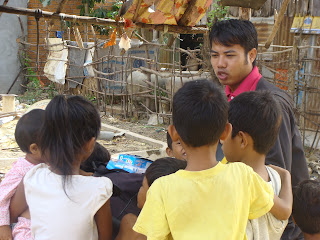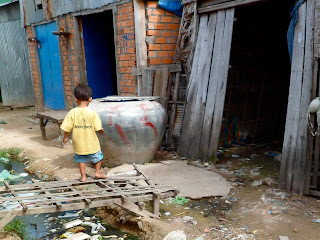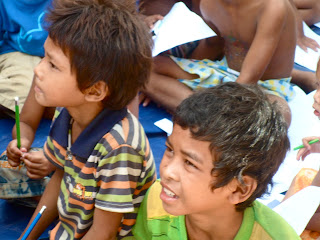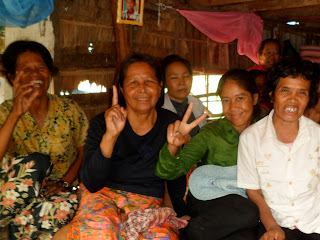On Monday, I visited the genocide
museum of Phnom Penh and the then a place called “The Killing
Fields.” These places are darkly intense, as their names suggest.
They commemorate the tragedies of the Khmer Rouge. There is not much
I can say, because the words will not mean as much to some people,
the words will not change what happened, and with emotions like this,
sometimes the words are scraped through a cheese grater to find their
resting place. I titled this Living fields, because one of my friends at World Relief's English name is Kevin Livingfield. I asked him why, and he said "I feel like a living field with Jesus." After being so moved by the horror of the "killing fields" I was so refreshed by this reconciliation. Anyways, For those who don't know about Cambodia's tragic
history, here's the brief run-down:
As context, The Khmer Rouge took place 1975-1979 after the Vietnam war had left 500,000 civilians killed, (many by the US), Cambodia had an unstable independence full of bloody coups for a few years. The communist rebel group known as The Khmer Rouge was, led by Pol Pot, was frustrated by western influence, and after they took power, they ordered the evacuation of cities and towns into rural areas, and
the annihilation of all foreign influences. Nearly two million people
out of a population of seven million were killed due to starvation,
overwork, execution, and disease under Pol Pot, who had created the
regime of terror, death, starvation, and genocide that would scar
Cambodia forever.
The
genocide museum is where the S-21 prison was located in central Phnom
Penh during the Khmer Rouge. It was basically a concentration camp, where hundreds of thousands were killed or died. Before the Khmer Rouge it was a school. It was terrible to see
how typical things you see at a school, a place of hope, had been
turned into things of evil. The classrooms were prisons and torture
chambers. Upstairs there were tiny stalls to house people. The monkey
bars were turned into a kind of torture that I will not describe. The
walls that used to have chalk boards and learning material are now
lined with faces. Prisoner mugshots are on one side, and the mugshots
of the guards are on the opposite wall). Most guards are children.
They said this was because they could more easily get them to follow
orders (by brainwashing and threatening). Sometimes children would be
the guards and executioners of their own parents.

The
Killing fields is where they would take people to kill them and
dispose of them. Pits full of bodies were discovered some time after
the Khmer Rouge, and the more people dug up, studied, and researched
this place, the more horrified they were. There were many things
there that were sad and haunting, like piles of skulls, and clothes
and bones along the path that you walk, because the rainy season
always brings up more things. One image that will stay with me
forever was a big tree next to a mass grave. This was were thousands
of women and children were executed, stripped, and thrown into the
pit. The tree was where they bashed the babies heads to kill them
before throwing them in. So what can I say?
Oh Khmer
Who knew that men could perform such
atrocity,
exploiting each other with violent
ferocity?
Pits in the ground are graves of
Monstrosity
Thousands of skulls- ghosts of the past
Torture and heartache and violence so
vast.
A trail from apathy to sickly aghast
Tell me, what was the terminal velocity
of the blows on the heads of innocent
babies?
Doesn't matter if its the sixties or
eighties
From U.S. Bombings to Pol Pot's
parading
Burma saw the freedom of the lady...
But Cambodia is still waiting.
When will the Khmer see a spark of
justice
There's so much we don't know, but just
have to trust this
isn't all there is in the plan for
Kampuchea
As sickness sweeps the streets and
wealth's not even an idea
for the children trapped between abuse
and diarrhoea.
The government says one thing but then
go all North Korea
on us, be honest, for once be true:
Where is the beautiful kingdom we once
knew?
Is there a way to find our way through?
Or is this all that these lives will
amount to?
Maybe if we stop giving
sympathy-tokens,
waving a fan at a man who is choking
If we open our ears to the loudly
unspoken,
And finally learn how to stand with the broken.










































































